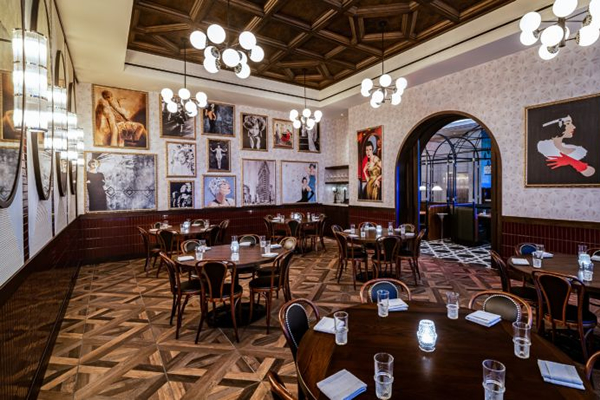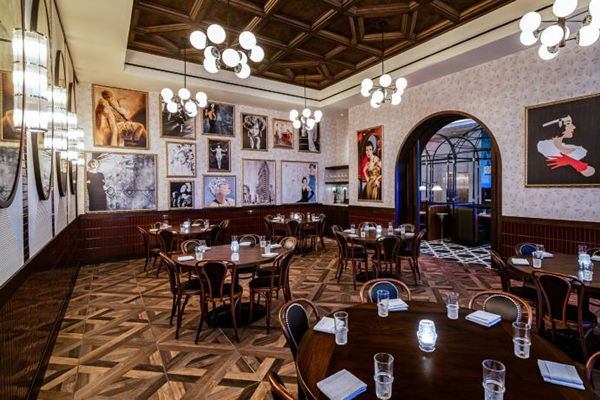
At the outset of 2020, D.C.-based Knead Hospitality + Design founders and co-owners (and partners for more than 20 years) Jason Berry and Michael Reginbogin envisioned big plans for their rapidly expanding realm of restaurants across the D.C. area.
“In March 2020, however, we thought that we were going to lose everything,” Reginbogin says.
Today, Knead has recovered, and then some. In the context of the sweep of more than 100 restaurant closings in D.C. since then, Berry and Reginbogin pulled out four restaurant openings, with several more planned for the rest of this year alone.
Not since the (somewhat slower) growth of Jose Andres’ ThinkFoodGroup has the city seen a locally based firm with a diverse set of concepts open so widely. Andres launched the first Jaleo back in 1993; his ThinkFoodGroup now runs 10 restaurants in D.C., plus stalls at Audi Field.
Yet Berry and Reginbogin promise that it’s not size that counts. “Biggest isn’t always best. We want to be the best operator in the city for the types of restaurants we offer.”
This spring’s opening of glitzy-retro diner Gatsby speaks directly to Reginbogin’s vision for that “our restaurants are experience-driven. They focus on the visual as much as the food and beverage offerings.”
Gatsby, located in Navy Yard, is a direct outgrowth of Berry’s belief that “like the Roaring ‘20s after the Spanish flu, there’s all this pent-up demand…. People will want to celebrate life, and they want to be part of that return to society,” he says.
In 2014, Berry served as COO for the Rosa Mexicano Restaurants, and Reginbogin had been working as director of operations for other large brands like B.R. Guest Restaurants, TAO, Milos, and Sushi Samba. After living in cities like Los Angeles and New York, they decamped for Washington, D.C., a city they’d visited dozens of times for work, with an idea of creating their own style of dining experience.
Both having attended the University of Southern California, the two met on AOL in their early 20s and started dating soon after. They have worked in the restaurant industry for their entire careers.
“D.C. is a beautiful, diverse city,” says Reginbogin, “but of all the cities we had lived in, we felt there was the most opportunity in D.C. The growth of the restaurant industry has been because of a welcoming regulatory environment as well as a city of quality, unique, and amazing restaurants. We want to surround ourselves with peers who are of the same philosophy.”
He says that they felt at home, welcomed “both professionally but also personally.” To further connect them with the LGBTQ community, the pair ensured that they were prepared for Pride month, setting up drink and food specials at their restaurants, with proceeds going to LGBTQ organizations.
“There was always the question of being able to both live and work with your partner,” Berry notes, “but because we excel at different areas, it works out. Our background in the restaurant industry gives us the perspective on how the restaurant should be constructed.”
When Berry and Reginbogin plan each new concept, they first analyze its urban and social geography. By understanding the restaurant’s space, interior and exterior, they put together a concept and then a menu (often along with a celebrity chef) to follow. But they also target specific parts of town.
“We tend to favor neighborhoods that are not reliant on one demographic for attracting a guest base,” says Reginbogin. “We tend to open where we can establish roots…. The pandemic taught everyone that it’s easy to lose a prized group of guests. You don’t want that one type to be the only guest you attract.”
This outlook led them to Navy Yard, the Wharf, and Penn Quarter, among other neighborhoods.
When they kicked off in 2015, opening Succotash in National Harbor, they invested some of their own capital, raised money from friends and family, and took on loan debt. “Our newer big restaurants are roughly $6-7 million projects. We are also opening smaller restaurants that cost significantly less, in the $2 million range,” said Reginbogin.
As of June, Knead operates five other concepts: Succotash, Mi Vida, The Grill, Gatsby, and Mah-Ze-Dahr, which abuts Gatsby and is run by baker Umber Ahmad, a 2019 James Beard semifinalist. They also run four quick-service stands inside Swingers, the massive adults-only minigolf concept out of London that just opened in Dupont Circle. Berry promises there is more to come in 2022 and beyond.
Knead’s other planned openings this year include Bistro du Jour, Mi Casa, another Succotash location in Penn Quarter, and another Mah-Ze-Dahr by the new Amazon HQ.
Back to Gatsby, the glam atmosphere showcases the group’s focus on space and design as much as menu. As the location is across from Nationals Stadium, the two envisioned an all-American restaurant. Yet the interior and atmosphere did not express to them a stereotypical diner with an Airstream and laminate-covered booths. Instead, the two visualized the swinging, Art Deco style of the 1920s when diners started to become popular. As it translates to plating, this means the overflowing bowl of pasta that might appear on a multi-page diner menu is lightened and elegantly served; the Caesar salad is vegan. No detail is spared, from soaring ceilings and retro prints to translucent silver plates with textured patterns.
“We want people to eat with their eyes,” Berry concludes. “Everything is important: the lighting, music, tableware, even the restrooms. If everything looks good and feels good, then everything tastes better, too.”







